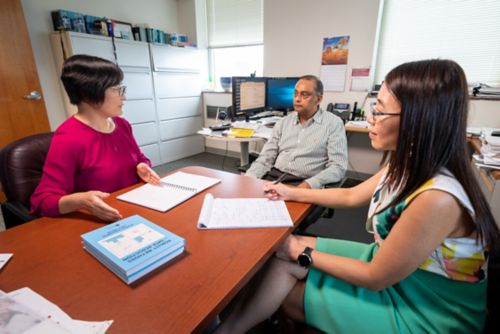St. Jude Family of Websites
Explore our cutting edge research, world-class patient care, career opportunities and more.
St. Jude Children's Research Hospital Home

- Fundraising
St. Jude Family of Websites
Explore our cutting edge research, world-class patient care, career opportunities and more.
St. Jude Children's Research Hospital Home

- Fundraising
Deo Kumar Srivastava Group
Leading biostatistical collaborations that analyze the long-term effects of childhood cancer survivorship
About the Srivastava Group
As investigators work to understand the long-term effects of childhood cancer survivorship, they collect enormous amounts of data over a patient’s lifetime. Correctly interpreting this complex data is an effort that requires advanced biostatistical analyses. Our group lets these complex datasets guide our methodological research as we work to develop new biostatistical approaches. A collaborative spirit underlies our work as we contribute biostatistical analyses and new methodologies to advance our understanding of childhood cancer survivorship.

Our research summary
A hallmark of our effort to advance the understanding of childhood cancer survivorship is our collaboration with investigators in the Department of Epidemiology and Cancer Control (ECC). In this partnership, we maintain responsibility for the biostatistical aspect of all studies, from inception of the project to publication of the manuscript. Real-life data, for which the application of existing methods is inadequate, motivates our research efforts.
Most of the real-life data ECC collects is from the SJLIFE cohort and the Childhood Cancer Survivor Study (CCSS)—a study comprised of 31 institutions. The hallmark of these cohorts is the continuous collection of recurrent data, which captures all individual occurrences of events, while the periodic collection of panel-count data captures the cumulative number of events between specified time periods. To properly analyze such data, our team developed several novel methods.
- Regression analysis of multivariate recurrent data with a dependent terminal event
- Semiparametric transformation models for joint analysis of multivariate recurrent and terminal events
- Statistical analysis of mixed recurrent event data
- Regression analysis of mixed recurrent-event and panel-count data
- Proportional odds model with mixed interval-censored failure time data
Another area of interest in the analysis of such complex cohort studies is the precise estimate of a cumulative incidence, which is the probability that a particular event—such as cardiotoxicity—occurs before a certain point in time. So far, we have developed an approach to precisely estimate a cumulative incidence using the parametric model, and we are in the process of expanding this approach to a non-parametric model.

While most of our collaborative work guides our research focus, a long-term primary research interest is the assessment of assumptions that underlie most of the inferential procedures used in everyday practice. Our work evaluates the impact of these assumptions on testing procedures, and we develop robust, alternative methods that address violations of the underlying assumption(s). Our group continues to test the assumption of univariate and multivariate normality through various approaches, and we develop new methods if our analyses discover the assumptions are not justified. Our most recent development assesses the impact of unequal censoring and insufficient follow-up on log-rank—a common test used in survivor analysis. Our ability to continually test and challenge assumptions made throughout a study ensures a high level of scientific and biostatistical integrity and accuracy.
The collaborative motivation behind our efforts guides our research and development approaches, and our group prides itself on the contributions we make to the understanding of childhood cancer survivorship.
Publications
Contact us
Deo Kumar Srivastava, PhD
Member, St. Jude Faculty
Department of Biostatistics
MS 768, Room R6010
St. Jude Children's Research Hospital

Memphis, TN, 38105-3678 USA GET DIRECTIONS